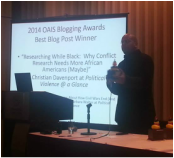Can we find a way to stop the police from killing black people? The question is a simple and powerful one. As an African American male, it is also one that I have been waiting to hear for most of my life. While overjoyed to have people from all parts of the nation as well as the world calling for this, at the same time I am a little disappointed at the limited nature of the ask. Limited you say? Yes, limited. I think that trying to find a way to stop the police from killing black people is analogous to what is often referred to as “negative peace” (i.e., when violence has stopped). In my book with Erik Melander and Pat Regan called the Peace Continuum, we noted that most scholarship on political conflict and violence maintained a focus on this form of peace and it has thus been “conflict-centric”. This is clearly understandable as life is something to be treasured and sustained. Following from this, we see discussions of training, demilitarizing, defunding, prosecuting, socializing and essentially scaring the police in an effort to reduce their violence.
0 Comments
Your comment will be posted after it is approved.
Leave a Reply. |
Analog - The Anti-BlogBy "Analog" I am referring to the adjective (i.e., relating to or using signals or information represented by a continuously variable physical quantity such as spatial position or voltage) and not the noun (i.e., a person or thing seen as comparable to another) for I wished to give voice to my thoughts which have come to me in a more or less continuous manner but which do so in a way that is not consistent in content or form. Thus you will see short stories, brief thoughts, haikus, low-kus and even a political cartoon or two. Archives
May 2024
Categories
All
|


 RSS Feed
RSS Feed
